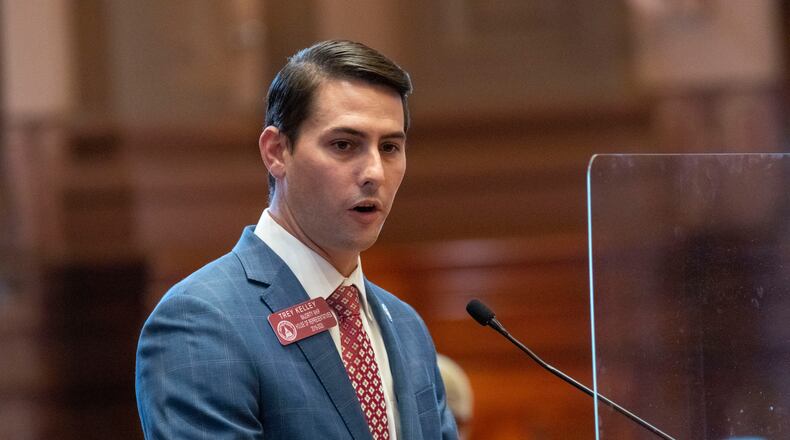After some last-minute drama, both chambers of the Georgia General Assembly voted late Friday to pass a bill that would curtail the ability of people to sue businesses and health care providers if they are diagnosed with COVID-19.
Senate Bill 359 would shield companies from legal liability unless they show "gross negligence, willful and wanton misconduct, reckless infliction of harm, or intentional infliction of harm."
The measure cleared the Georgia Senate on a largely party-line vote of 34 to 16 during the final minutes of the 2020 legislative session. That came after the House passed the measure 104 to 56 earlier in the evening. It now heads to Gov. Brian Kemp’s desk for his signature.
More background: Georgia businesses seeking protections from coronavirus lawsuits
The Republican unity obscured what had been an hours-long tug-of-war between party leaders in the two chambers.
Earlier this week, the Senate passed a broader version of the bill, and on Friday the chamber's GOP leaders tried to amend the separate House-passed measure to add an extra year of protection for businesses.
But with the House already adjourned for the year, Senate leaders were left with little option than to swallow what the House had passed.
“We’re in the position of having to accept their bill or we’re faced with the potential prospect that we leave this chamber, leave this building and not have a COVID liability bill for our citizens and our businesses,” said state Sen. John Kennedy, a Macon Republican. "Unfortunately I think we are faced with a choice to accept their SB 359."
Senate Democrats were unsparing in their criticism.
State Sen. Zahra Karinshak, a Duluth Democrat, called the bill "a bunch of gobbledygook,” and Atlanta Democrat Nan Orrock said she was troubled by how little attention legislators were paying to the “backbone workers that are out here working hard through this pandemic.”
The legislation is a major priority of the business community, which believes extra legal protection is merited for companies that are reopening while following social distancing and other safety protocols outlined by public health officials.
"We all recognize the COVID crisis is a serious one,” said state Rep. Trey Kelley, R-Cedartown, who led negotiations Friday. “It’s one that’s caused us all to have to change the way we operate, and we need to offer protections to our business community and our health care community."
Democrats raised questions about the legal avenues that will remain available to wronged workers and patrons. Gross negligence cases are extremely difficult to prove, they said.
“Businesses don’t get COVID. People get COVID,” said House Minority Leader Bob Trammell, D-Luthersville. “This bill doesn’t seek to protect people from COVID. It seeks to seeks to protect businesses against people.”
Kelley said employees will still be able to file workers compensation claims under the bill.
Democrats also criticized the liability protections being afforded to senior care facilities, whose practices faced intense scrutiny in Georgia even before the pandemic struck. Since then, thousands of nursing home residents across the state have come down with the coronavirus and more than 1,200 have died.
“What about the people in nursing homes who won’t have a legal recourse because of this legislation?” said state Rep. Al Williams, D-Midway.
If signed by Kemp, the measure’s legal protections would sunset on July 14, 2021. The bill also clarifies that businesses should post signs warning that people entering the premises are waiving their civil liability.
The Metro Atlanta Chamber, health care providers and Atlanta’s major sports teams are said to be supportive of the bill. And the Georgia Trial Lawyers Association, which has resisted other tort overhauls in the past, indicated it was also favorable.
“Throughout this process we have been unwavering on three things: that this bill be limited to COVID cases; it be limited in time; and that it not protect against gross negligence,” said Jonathan Pope, president-elect of the Georgia Trial Lawyers Association. “As the bill passed out of the Special Committee last night, we believe this bill meets those requirements.”
Union groups like the AFL-CIO have been vocally against legal liability legislation.
Gov. Brian Kemp has taken some unilateral steps to limit legal risks for hospitals, medical personnel and others, but the protections are set to lapse when his emergency powers expire.
Staff writer Mark Niesse contributed to this article.
Keep Reading
The Latest
Featured





